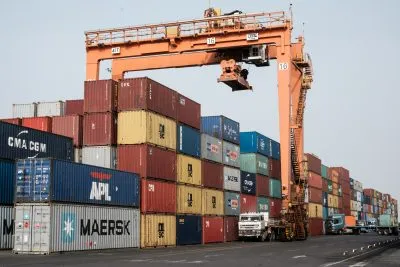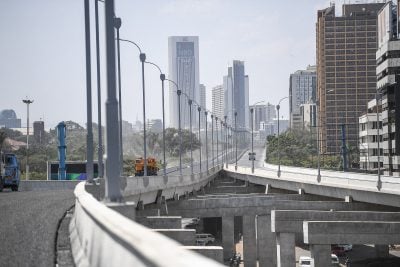At the turn of the 20th century, tropical forests teeming with fauna and wildlife stretched across West Africa in a verdant belt from Cameroon to Liberia and beyond. Yet by the second decade of the 21st century, it was estimated that some 80-90% of those forests had disappeared as unsustainable and damaging agricultural techniques took hold. Whether through outdated smallholder methods or ceaseless industrial farming, the production of palm oil, soy, beef, paper and pulp have all contributed to the gradual destruction of forests vital to combating climate change, desertification, soil erosion, and flooding.
As part of its commitment to sustainability, the World Economic Forum is using its convening power to turn back the clock. Since 2015, the organisation has hosted the Tropical Forest Alliance, a global umbrella partnership that brings together governments, the private sector, and civil society organisations in a bid to combat deforestation. With millions of regional livelihoods at stake, the TFA’s mission goes beyond mere forest protection and restoration to embracing fundamental questions of economic development in agricultural communities. For Justin Adams,
executive director at TFA, the solution requires a detailed understanding of the needs of local people.
“We know that individual actors on their own can never address the wicked, complex problem that deforestation is. Supply chain action and companies making commitments is great, but how does that translate on the ground, what does it feel like if you’re a cocoa farmer just getting by who wants to get your kids into college? If you’re told you have to constrain how you operate because Western companies don’t want deforestation in the supply chain, how do you balance that?”
Funded by European donor governments, TFA works with partner governments in producer countries, NGOs and some 70 companies, and focuses on the globe’s three main tropical forest regions – Latin America, South-East Asia and Central and West Africa. Key to the problem of deforestation in all three regions is the unconstrained production of palm oil, an edible vegetable oil commonly used in the production of foods, cosmetics, cleaning products and fuels. Oil palm plantations currently cover more than 27m hectares of the Earth’s surface, according to NGO Rainforest Rescue, which says that some
66m tons of palm oil are produced annually, often on land totally cleared of other trees and shrubs. Adams says that working on solutions to the damaging effects of rampant palm oil production is crucial to the TFA.
“In West and Central Africa we’ve been working and supporting processes to build capacity and awareness in the last few years. There’s a TFA initiative called the Africa Palm Oil Initiative that’s working across nine countries in West Africa, looking at what’s needed to balance production, how and where it’s being developed, and how to avoid the situation we saw in Southeast Asia where you have companies buying land, throwing people off it and clearing forests.”
And yet despite palm oil’s reputation as one of the principle agricultural tools of deforestation, Adams says that solutions can and must be found that reflect the legitimate agricultural interests of farming communities, businesses and government treasuries in Africa and beyond.
“Oil palm is a staple crop in West Africa, an indigenous crop. You’ve got biodiversity, communities thriving and yet that story is not known and told. I was at an oil palm business in West Africa a few weeks ago called Benso Oil Palm Plantation [BOP], a subsidiary of Wilmar, a large Asian conglomerate. I have rarely seen a company do such an extraordinary job of community engagement and bringing smallholders farmers into their concession to give them long-term offtake agreements for producing palm oil in a certain way. The community are telling you they’ve had 20 years of being supported and are now sending their kids to college and have got medical facilities in the village. It’s a wonderful example of a business producing sustainable palm oil and working with the community.”
Working with business, government and the community involves making the positive case for sustainable agriculture and forest preservation by replicating such examples of best practice.
“There are such enormous opportunities – [but] how do we balance the protection of nature and find ways of supporting communities in critical landscapes? It’s about agriculture and livelihoods, building resilient incomes and landscapes.”
TFA maintains a similar focus on cocoa, another major contributor to deforestation. Its Cocoa Forest Initiative includes 35 of the world’s biggest chocolate companies, working alongside governments and foundations to pursue sustainability. Adams says that helping to embrace agricultural diversity by moving West African countries away from an overreliance on cocoa is also key to the TFA’s plans to save forests, and involves boosting the enabling environment for non-cocoa businesses. Central to all these efforts is the convening role of the TFA and the WEF – encouraging dialogue and bringing diverse interests together.
“I think there’s a deepening understanding of deforestation but it’s still very nascent, and that’s not just an issue in tropical forest countries but in most of the Western world as well. You have silos between environmental and agriculture ministries and finance ministries, so how do you get governments to work across departments? How do you get businesses to step out of their own narrow confines of supply chains? You’re seeing more and more recognition that you need public-private partnerships [PPPs] to do it. Collaboration takes time and effort. Part of what WEF can do with the TFA is to help people see and engage in these ways.”
That strategy is one that WEF is taking into its other sustainability initiatives. WEF is currently rolling out its Global Plastic Action Partnership to
reduce plastic waste, which by 2050 is estimated to account for more weight at sea than fish. The Partnership, which launched in Ghana in August and also focuses on Vietnam and Indonesia, will adopt this collaborative framework, says media lead Maxwell Hall.
“We’re well known for Davos but a lot of the work we do around the year is creating a platform for these really systemic challenges that no government, business or single rock star entrepreneur can solve. You need to make the links with government, business, regional agencies, right down to grassroots level, and get these people collaborating together. That’s where WEF comes in, working on big systemic challenges, something no global actor can solve alone. You can only solve [them] if you have all the stakeholders working together.”
Want to continue reading? Subscribe today.
You've read all your free articles for this month! Subscribe now to enjoy full access to our content.
Digital Monthly
£8.00 / month
Receive full unlimited access to our articles, opinions, podcasts and more.
Digital Yearly
£70.00 / year
Our best value offer - save £26 and gain access to all of our digital content for an entire year!
 Sign in with Google
Sign in with Google 



